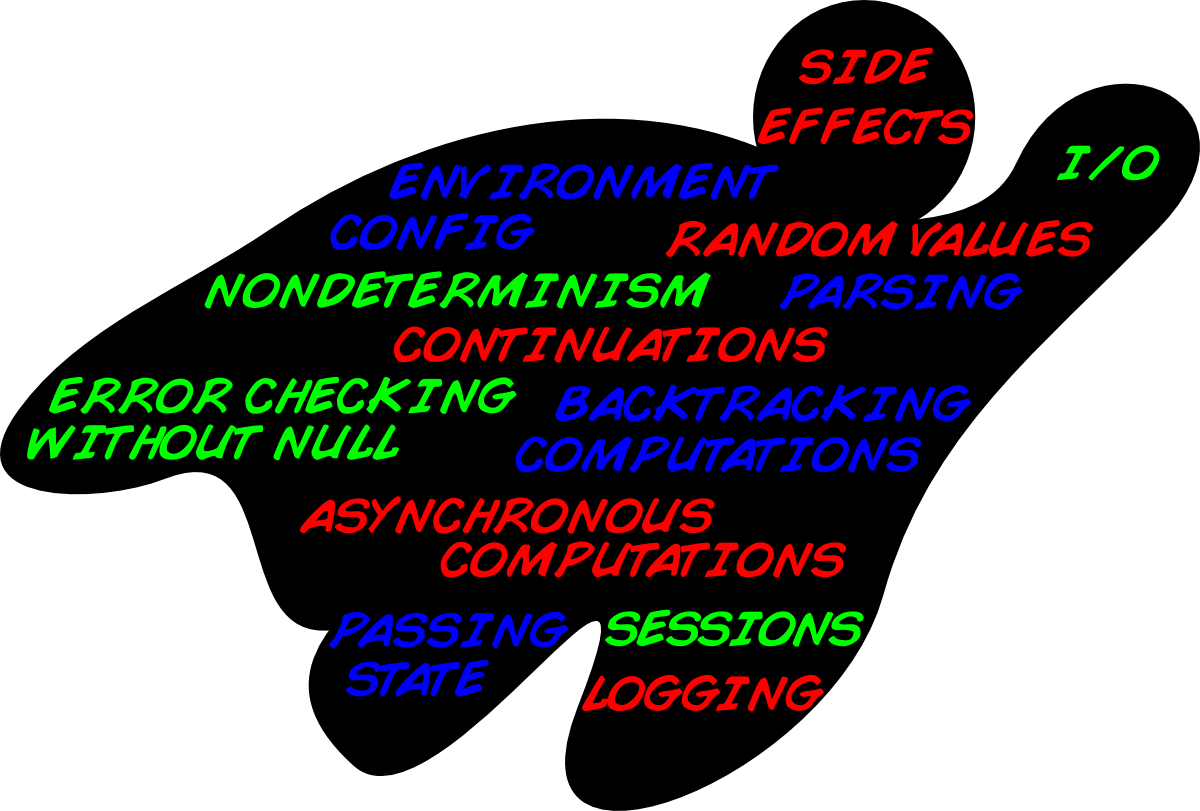Monads to the Rescue

Katie Miller (@codemiller)
Developer at Red Hat
- Found in particular setting: Where might you find monads?
- Distinctive costume: What do monads look like?
- Force for good: What are monads good for?
- Special, unexpected abilities: What special or unexpected abilities do monads have?





Functional Programming Paradigm
- "[I]ts fundamental operation is the application of functions to arguments." - John Hughes
- Pure functions don't have side-effects; they are referentially transparent
- Functions are first-class; higher-order functions take other functions as arguments or return a function as a result
FP Features
- Immutable data
- Lazy evaluation
- Lambda expressions
- Closures
- Pattern matching
- Alternatives to loops
- Partial application/currying
Haskell Example
myList = ["a"] --"a":[] myFunc :: (Num a, Enum a) => [b] -> Int -> [(a,b)] myFunc (x:xs) n = foldr (\i acc -> (i,x):acc) [] (take n [1..]) -- foldr :: (a -> b -> b) -> b -> [a] -> bmyFunc myList 3 = 1:2:3:[] 1 (\i acc -> (i,x):acc) 2 (\i acc -> (i,x):acc) 3 (\i acc -> (i,x):acc) [] (1 (\i acc -> (i,x):acc) (2 (\i acc -> (i,x):acc) (3 (\i acc -> (i,x):acc) []))) (1 (\i acc -> (i,x):acc) (2 (\i acc -> (i,x):acc) [(3,"a")])) (1 (\i acc -> (i,x):acc) [(2,"a"),(3,"a")]) [(1,"a"),(2,"a"),(3,"a")]
Java 8 Lambdas
public interface Function<T, R> {
public R apply(T t);
}
public interface BiFunction<T, U, R> {
R apply(T t, U u);
}
public static List<Integer> map(List<Integer> list, Function<Integer, Integer> func) {
List<Integer> result = new ArrayList<>();
for (Integer num : list) {
result.add(func.apply(num));
}
return result;
}
System.out.println(map(Arrays.asList(1, 2, 3), i -> i + 1));
// [2, 3, 4]FP Benefits
- Ability to reason about program behaviour; can use equational reasoning
- Higher-order functions and lazy evaluation facilitate more modular programs; code reuse
- Removing side-effects aids concurrent programming
- Programs often more succinct
- Automated test generation with tools such as QuickCheck





The Monad Costume
A monad is a structure that puts values in a computational context and implements two functions:
- Return: a → Monad a
(also known as Unit/Pure) - Bind: (Monad a, (a → Monad b)) → Monad b
(also known as FlatMap/SelectMany)





A Few Monads
- Identity Monad
- Maybe/Option Monad
- List Monad
- IO Monad
- State Monad
- Writer Monad
- Reader Monad
- Continuation Monad
Monad Laws
- Left Identity: return x >>= f ≡ f x
- Right Identity: m >>= return ≡ m
- Associativity: (m >>= f) >>= g ≡ m >>= (\x -> f x >>= g)
Maybe/Option Monad
Context of possible value absence-- data Maybe a = Just a | Nothing
returnMaybe :: a -> Maybe a
returnMaybe a = Just a
returnMaybe 7
-- Just 7
bindMaybe :: Maybe a -> (a -> Maybe b) -> Maybe b
Nothing `bindMaybe` f = Nothing
Just a `bindMaybe` f = f a
Just 7 `bindMaybe` (\x -> returnMaybe (x+1))
-- Just 8
Nothing `bindMaybe` (\x -> returnMaybe (x+1))
-- Nothing
Just 7 `bindMaybe` (\x -> returnMaybe (x+1)) `bindMaybe` (\y -> returnMaybe (y*5))
-- Just 40
Maybe in Java 8
public abstract class Maybe<A> {
public abstract <B> Maybe<B> bind(Function<A, Maybe<B>> func);
public static <A> Nothing<A> nothing() {
return new Nothing<>();
}
public static <A> Just<A> just(A value) {
return new Just<>(value);
}
public static <A> Maybe<A> fromNullable(A value) {
if (value == null) return nothing();
else return just(value);
}
}
private static final class Nothing<A> extends Maybe<A> {
@Override
public <B> Maybe<B> bind(Function<A, Maybe<B>> func) {
return nothing();
}
}
private static final class Just<A> extends Maybe<A> {
private final A value;
private Just(A value) {
this.value = value;
}
@Override
public <B> Maybe<B> bind(Function<A, Maybe<B>> func) {
return func.apply(value);
}
}
Maybe vs Null
public static Maybe<Integer> processIntegerWithMaybe(Maybe<Integer> maybeNum) { return maybeNum.bind(x -> just(x + 1)).bind(y -> just(y * 5)); }public static Integer processInteger(Integer num) { if (num == null) return null; // Or perhaps throw new IllegalArgumentException("Num cannot be null!"); Integer incrementedNum = increment(num); if (incrementedNum == null) return null; return multiplyByFive(incrementedNum); } public static Integer increment(Integer num) { return (num == null) ? null : num + 1; } public static Integer multiplyByFive(Integer num) { return (num == null) ? null : num * 5; }
List Monad
Context of nondeterminism-- picture a type declaration something like: data [a] = [] | a:[a]
returnList :: a -> [a]
returnList a = [a]
returnList "Bar"
-- ["Bar"]
bindList :: [a] -> (a -> [b]) -> [b]
bindList l f = foldr (\x acc -> f x ++ acc) [] l
["Super","Spider","Bar"] `bindList` (\x -> returnList (x ++ "man"))
-- ["Superman","Spiderman","Barman"]
public abstract class List<A> {
public abstract <B> List<B> bind(Function<A, List<B>> func);
public abstract List<A> append(List<A> list);
public abstract <B> B foldRight(BiFunction<A, B, B> func, B acc);
public static <A> List<A> cons(A value, List<A> list) {
return new ItemList<A>(value, list);
}
public static <A> EmptyList<A> emptyList() {
return new EmptyList<>();
}
public static <A> List<A> itemList(A... values) {
if (values.length == 0) return emptyList();
List<A> list = emptyList();
for (int i = values.length - 1; i >= 0; i--) {
list = cons(values[i], list);
}
return list;
}
}
private static class EmptyList<A> extends List<A> {
@Override
public <B> List<B> bind(Function<A, List<B>> func) {
return emptyList();
}
}
private static class ItemList<A> extends List<A> {
private final A value;
private final List<A> next;
private ItemList(A value, List<A> next) {
this.value = value;
this.next = next;
}
@Override
public <B> List<B> bind(Function<A, List<B>> func) {
return foldRight((value, acc) -> (func.apply(value)).append(acc), emptyList());
}
}





Why Monads Are Useful
They help to combat the perils of:
- Code duplication
- Unnecessary complexity
- Poor maintainability

Monadic Heroes
- Identity Monad Can blend in
anywhere - Maybe Monad If this hero succeeds,
you'll know it - List Monad Can do many things
at once - IO Monad Puts world manipulators
where they belong - State Monad Always keeps track of
the state of affairs - Writer Monad Never forgets
a detail - Reader Monad Can tell what
you're thinking - Continuation Monad Can travel
through time - Parser Monad Speaks every language
known to computer
Maybe Monad Example Use
currencySupply = [(20, 5), (50, 10), (100, 1)]
-- lookup :: Eq a => a -> [(a, b)] -> Maybe b
unitsLeft :: [(Int, Int)] -> Int -> Int -> Maybe Int
unitsLeft supply val num = (lookup val supply) `bindMaybe` (\u -> if u - num < 0
then Nothing else returnMaybe (u - num))
unitsLeft currencySupply 20 3
-- Just 2
unitsLeft currencySupply 20 10
-- Nothing
unitsLeft currencySupply 70 1
-- Nothing
// public static <K, V> Maybe<V> lookup(List<Tuple<K, V>> tupleList, K key) { }
public static Maybe<Integer> unitsLeft(List<Tuple<Integer, Integer>> currencySupply,
Integer value, Integer unitsWanted) {
return lookup(currencySupply, value).bind(numUnits -> (numUnits - unitsWanted < 0)
? nothing() : just(numUnits - unitsWanted));
}
List Monad Example Use
listNotes :: [Int] -> [String] -> [String]
listNotes amts curs = amts `bindList` (\amt -> curs `bindList` (\cur ->
returnList (cur ++ (show amt))))
listNotes [20, 50, 100] ["$AU", "$NZ"]
-- ["$AU20","$NZ20","$AU50","$NZ50","$AU100","$NZ100"]
public static <String> List<String> listNotes(List<Integer> amts, List<String> currs) {
return amts.bind(amt -> currs.bind(curr -> itemList(curr + amt.toString())));
}





List (Monad a)) → Monad (List a)
Sequence Maybe Demo
currencySupply = [(20, 5), (50, 10), (100, 1)]
checkComboServiceable :: [(Int, Int)] -> [(Int, Int)] -> Maybe [Int]
checkComboServiceable cur combo = sequenceMaybe (foldr (\(val,num) acc ->
(unitsLeft cur val num):acc) [] combo)
checkComboServiceable currencySupply [(20, 1), (50, 1)]
-- Just [4,9]
checkComboServiceable currencySupply [(20, 6), (50, 1)]
-- Nothing
Sequence List Demo
createValueUnitPairs :: Int -> Int -> [(Int, Int)]
createValueUnitPairs amt val = zip (repeat val) [0..(amt `div` val)]
createValueUnitPairs 70 20
-- [(20, 0), (20, 1), (20, 2), (20, 3)]
combinations :: Int -> [(Int, Int)]
combinations amt = sequenceList (foldr (\val acc ->
(createValueUnitPairs amt val):acc) [] [20, 50, 100])
combinations 70
-- [[(20, 0), (50, 0), (100, 0)],
-- [(20, 0), (50, 1), (100, 0)],
-- [(20, 1), (50, 0), (100, 0)],
-- [(20, 1), (50, 1), (100, 0)],
-- [(20, 2), (50, 0), (100, 0)],
-- [(20, 2), (50, 1), (100, 0)],
-- [(20, 3), (50, 0), (100, 0)],
-- [(20, 3), (50, 1), (100, 0)]]
Implementing Sequence
mapMaybe :: (a -> b) -> Maybe a -> Maybe b
mapMaybe f Nothing = Nothing
mapMaybe f (Just a) = Just (f a)
lift2Maybe :: (a -> b -> c) -> Maybe a -> Maybe b -> Maybe c
lift2Maybe f ma mb = (mapMaybe f ma) `bindMaybe` (`mapMaybe` mb)
sequenceMaybe :: [Maybe a] -> Maybe [a]
sequenceMaybe ls = foldr (\l acc -> lift2Maybe (:) l acc) (returnMaybe []) ls
sequenceMaybe [Just 4, Just 3, Just 7] =
[Just 4, Just 3, Just 7] Just (7:[])
[Just 4, Just 3] Just (3:[7])
[Just 4] Just (4:[3,7])
[] Just [4,3,7]
mapList :: (a -> b) -> [a] -> [b]
mapList f l = foldr (\x acc -> (f x):acc) [] l
lift2List :: (a -> b -> c) -> [a] -> [b] -> [c]
lift2List f la lb = (mapList f la) `bindList` (`mapList` lb)lift2Maybe f ma mb = (mapMaybe f ma) `bindMaybe` (`mapMaybe` mb)
sequenceList :: [[a]] -> [[a]]
sequenceList ls = foldr (\l acc -> lift2List (:) l acc) (returnList []) lssequenceMaybe ls = foldr (\l acc -> lift2Maybe (:) l acc) (returnMaybe []) ls
sequenceList [[(20,0),(20,1),(20,2)],[(50,0),(50,1)]] =
[[(20,0),(20,1),(20,2)],[(50,0),(50,1)]] [(50,0):[],(50,1):[]]
[[(20,0),(20,1),(20,2)]] [(20,0):[(50,0)],(20,0):[(50,1)],
(20,1):[(50,0)],(20,1):[(50,1)],
(20,2):[(50,0)],(20,2):[(50,1)]]
[] [[(20,0),(50,0)],[(20,0),(50,1)],
[(20,1),(50,0)],[(20,1),(50,1)],
[(20,2),(50,0)],[(20,2),(50,1)]]
Monad Type Class
class Monad m where
(>>=) :: m a -> (a -> m b) -> m b
return :: a -> m a
instance Monad Maybe where
Nothing >>= f = Nothing
Just a >>= f = f a
return a = Just a
instance Monad [] where
l >>= f = foldr (\x acc -> f x ++ acc) [] l
return x = [x]
fmap :: Monad m => (a -> b) -> m a -> m b
fmap f ma = ma >>= (\a -> return (f a))
liftM2 :: Monad m => (a -> b -> c) -> m a -> m b -> m c
liftM2 f ma mb = (fmap f ma) >>= (`fmap` mb)
sequence :: Monad m => [m a] -> m [a]
sequence l = foldr (m acc -> liftM2 (:) m acc) (return []) l
Monad's Secret Weapon:
The Monad Library
- sequence
- ap
- liftM2
- join
- filterM
- forM
- foldM
- when
- ...and dozens more






Links, References and Credits

Code Credits
Image Credits
References
Recommended Reading
Questions?
Slides:
monads.codemiller.com
